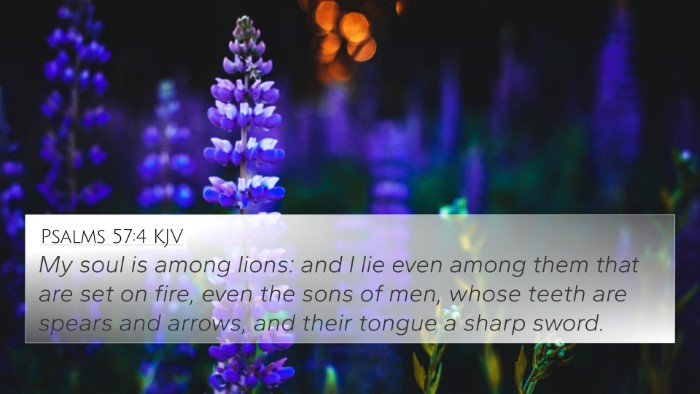Psalms 64:3 - Verse Meaning and Interpretation
Verse Reference: Psalms 64:3
Verse: "Who whet their tongue like a sword, and bend their bows to shoot their arrows, even bitter words:"
Summary of Meaning
Psalms 64:3 speaks of the malicious intent of enemies who use their words as weapons. The imagery of sharpening a tongue like a sword illustrates the power of words to harm others, while the bow and arrow metaphor signifies the precision and intent behind their insulting speech. The verse emphasizes the destructive nature of slander and deceit, and how such verbal attacks can pierce the heart of the innocent.
Commentary Insights
Matthew Henry's Commentary
Matthew Henry highlights how the psalmist portrays the wicked as using their speech as a weapon of warfare. He points out that, just as arrows can strike from a distance, so can words reach and injure a person's reputation. This shows the need for believers to be on guard against slander and to seek refuge in God from such adversities.
Albert Barnes' Notes on the Bible
Albert Barnes elaborates on the idea that the enemies of the righteous are skilled in their use of deception and malice. He notes that their words are aimed not just to wound but to cause despair and fear in the hearts of their targets. The act of "whetting" their tongues indicates a premeditated intention to harm, highlighting the strategic nature of their verbal assaults.
Adam Clarke's Commentary
Adam Clarke focuses on the emotional impact that such cruel words can have on their victims. He urges readers to be aware of the spiritual implications and advises those who feel besieged by slander to maintain their trust in God’s protection. Clarke interprets this verse as both a warning and a call to rely on divine strength in the face of verbal aggression.
Related Biblical Cross-References
- Proverbs 12:18: “There is that speaketh like the piercings of a sword: but the tongue of the wise is health.”
- James 3:6: “And the tongue is a fire, a world of iniquity: so is the tongue among our members, that it defileth the whole body.”
- Psalms 57:4: “My soul is among lions: and I lie even among them that are set on fire, even the sons of men, whose teeth are spears and arrows, and their tongue a sharp sword.”
- Proverbs 18:21: “Death and life are in the power of the tongue: and they that love it shall eat the fruit thereof.”
- Psalms 55:21: “The words of his mouth were smoother than butter, but war was in his heart: his words were softer than oil, yet were they drawn swords.”
- Romans 3:13: “Their throat is an open sepulchre; with their tongues they have used deceit; the poison of asps is under their lips.”
- 1 Peter 3:10: “For he that will love life, and see good days, let him refrain his tongue from evil, and his lips that they speak no guile.”
Thematic Connections
Psalms 64:3 fits within a broader theme of the power and danger of speech found throughout Scripture. This theme connects various verses that discuss the impact of words, particularly in how they can be used for both good and evil. Understanding these connections assists in a deeper comprehension of Biblical teaching regarding the control of one's speech and the impact it has within communities.
Practical Application
Reflecting on Psalms 64:3 reminds one of the importance of guarding one’s own speech. Believers are called to be vigilant against both internal and external sources of slander. Moreover, it encourages an examination of how words are employed in daily interactions, fostering a culture of encouragement rather than division.
Research and Study Tools
For those interested in deeper study of Psalms 64:3 and its connections, consider using the following tools:
- Bible concordance
- Bible cross-reference guide
- Cross-reference Bible study methods
- Comprehensive Bible cross-reference materials
- Tools for Bible cross-referencing
Conclusion
Psalms 64:3 serves as a potent reminder of the capacity for harm that exists in our words. It urges readers to reflect on their own communication styles and encourages them to seek protection and guidance from God in navigating a world filled with potential verbal dangers.










